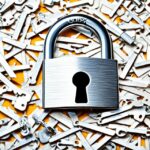The Journey Towards Data Destruction Certification
The digital transformation of enterprises has led to a shift in the maturity of information management models globally. With advancements in data management technologies, organizations need to understand how to protect data throughout its lifecycle. This includes the Archive stage, which addresses retention policies, and the Dispose stage, which focuses on end-of-life data sanitisation. To ensure data policies are enforced and data is irrecoverable upon destruction, organizations must proactively address these stages.
Within data-centric ecosystems, proper information management models play a crucial role in safeguarding valuable data. Organizations must navigate the complex landscape of data security to meet regulatory requirements and protect sensitive data from falling into the wrong hands. Implementing a comprehensive data destruction certification is an important step towards achieving these goals.
Importance of Data Destruction Certification
Effective data sanitization is crucial for organizations, particularly when dealing with personal data at the end of its lifecycle. Many countries hold organizations accountable for proper data retention and disposal. To meet these requirements, organizations need to prioritize data destruction certification and compliance with privacy regulations such as GDPR and ISO 27001.
Assessing privacy posture and implementing a comprehensive data retention policy are essential steps towards readiness. In addition, establishing a dedicated privacy team and appointing a Data Protection Officer (DPO) can significantly strengthen an organization’s data protection framework. The DPO’s role is to ensure compliance with data protection laws, monitor data processing activities, and act as a point of contact for data subjects and regulatory authorities.
“Data destruction certification and compliance with privacy regulations are imperative for organizations to protect sensitive information and maintain trust.”
By obtaining a data destruction certification, organizations demonstrate their commitment to data security and compliance. It provides assurance to stakeholders, customers, and regulatory bodies that the organization has implemented measures to protect data throughout its lifecycle and has a robust process for secure data destruction.
Benefits of Data Destruction Certification
- Enhanced data security and confidentiality
- Compliance with privacy regulations
- Protection of sensitive information
- Mitigation of data breach risks
- Demonstration of responsible data management
By prioritizing data destruction certification and compliance, organizations can mitigate the risks associated with data breaches, safeguard their reputation, and avoid significant financial penalties.
Data Destruction Certification Process
The data destruction certification process involves several steps to ensure secure data erasure and compliance with legal and industry standards. Organizations should follow these key steps:
- Evaluation: Assess current data destruction practices and identify gaps.
- Policy Development: Create a comprehensive data retention and disposal policy.
- Training and Awareness: Educate employees on data destruction best practices.
- Partner Selection: Choose a reputable data destruction partner with appropriate certifications.
- Implementation: Deploy secure data erasure methods and maintain a secure chain of custody.
- Certification: Obtain a data destruction certification to validate compliance.
Having a structured and certified data destruction process instills confidence in stakeholders, customers, and employees, ensuring that data is properly handled and disposed of in accordance with legal and regulatory requirements.
Data Destruction and Recycling Services
When it comes to secure data erasure, ISO certifications, and responsible disposal, companies like Computer Data Shred and Computer Disposal Experts are leading the way. These trusted service providers specialize in secure data destruction and recycling, ensuring the complete eradication of sensitive information before the recycling process begins.
By prioritizing secure data erasure, these companies guarantee that no trace of data remains, mitigating the risk of unauthorized access and data breaches. Their commitment to secure disposal means that organizations can confidently dispose of their data-centric assets without compromising sensitive information.
One key aspect that differentiates these companies is their adherence to industry standards and legal requirements. With certifications like ISO 9001 and ISO 14001, they demonstrate their commitment to quality management systems and environmental management practices.
ISO 9001 certifies that these companies have implemented a robust quality management system to consistently meet customer expectations and enhance customer satisfaction. This certification ensures that the data destruction and recycling services provided are of the highest standard.
ISO 14001 highlights their dedication to environmental responsibility. It verifies that these companies have established and effectively implemented an environmental management system, reducing their environmental impact during the data destruction and recycling process.
Not only do these companies prioritize secure data erasure and compliance, but they also offer a comprehensive range of recycling services. From computer and laptop recycling to mobile phone and IT recycling, organizations can trust them to handle their electronic waste responsibly.
Let’s take a look at a breakdown of their recycling services:
| Recycling Service | Description |
|---|---|
| Computer Recycling | Responsible disposal of desktop computers and peripherals |
| Laptop Recycling | Sustainable disposal of laptops and accompanying accessories |
| Mobile Phone Recycling | Secure disposal of mobile phones, ensuring data privacy |
| IT Recycling | Environmentally friendly disposal of IT equipment and components |
With a strong focus on secure data erasure and responsible disposal, these companies provide organizations with the peace of mind they need when disposing of their data-bearing assets.
The Security and Environmental Impact of Data Destruction
Data destruction companies prioritize data security by employing advanced methods to remove and destroy data irreversibly. This includes hard drives, SSDs, and other data-bearing media. They maintain a secure chain of custody throughout the recycling process, ensuring data confidentiality. Additionally, these companies also prioritize environmental responsibility by using eco-friendly methods in their data destruction processes.
By partnering with these reputable data destruction companies, organizations not only protect their sensitive information but also contribute to a sustainable future by reducing electronic waste and minimizing their environmental footprint.
Take a look at the following table to understand the significance of data destruction methods and their impact on both data security and the environment.
| Data Destruction Methods | Data Security | Environmental Responsibility |
|---|---|---|
| Secure Data Erasure | Ensures permanent removal of data | Reduces electronic waste by enabling reuse |
| Physical Destruction | Physically destroys data-bearing media | Requires proper disposal to avoid environmental harm |
| Degaussing | Uses a powerful magnetic field to erase data | Should be followed by responsible recycling of degaussed media |
| Shredding | Renders data-bearing media into small, unreadable pieces | Requires recycling of shredded material |
Ensuring data security and environmental responsibility go hand in hand. By employing effective data destruction methods, organizations can safeguard their sensitive information while contributing to a sustainable future.
Data Destruction Certification Process
Obtaining a data destruction certification involves following specific processes. These processes include secure data erasure, adherence to legal and industry standards, and environmentally responsible disposal. Companies like Computer Disposal Experts aim to provide certification within 7 working days.
During the certification process, a secure chain of custody is maintained to guarantee the complete and secure destruction of data. This ensures that data remains protected throughout the entire certification timeline.
Benefits of Data Destruction Certification
- Ensures compliance with privacy regulations
- Protects sensitive data from unauthorized access
- Reduces the risk of data breaches and identity theft
- Enhances the organization’s reputation for data security
By obtaining a data destruction certification, organizations demonstrate their commitment to safeguarding data and maintaining a secure chain of custody throughout the entire data lifecycle.
With a certified data destruction process in place, organizations can confidently dispose of data-bearing assets while mitigating the risks associated with data breaches and unauthorized data recovery.
Conclusion
Embarking on a data destruction certification journey is crucial for organizations to ensure data security and compliance with privacy regulations. By partnering with reputable companies that offer secure data erasure services and environmentally responsible disposal, organizations can effectively safeguard their data and contribute to a sustainable future.
Obtaining a data destruction certification provides an additional layer of security, giving organizations the assurance that their sensitive information is irrecoverably erased. This certification also reflects the organization’s commitment to responsible data management, demonstrating their dedication to protecting the privacy and confidentiality of their stakeholders.
With the increasing focus on data protection and environmental responsibility, organizations must prioritize secure data erasure and ethical disposal practices. By collaborating with certified data destruction companies, organizations can not only mitigate the risk of data breaches but also contribute to reducing electronic waste and minimizing the environmental impact of their operations.
By engaging in a data destruction certification journey and embracing secure data erasure practices, organizations align themselves with industry standards and legal requirements. Moreover, they uphold their ethical and social responsibilities by actively participating in the creation of a secure and sustainable digital ecosystem.
FAQ
What is the journey towards data destruction certification?
The journey towards data destruction certification involves following secure data erasure practices, adhering to legal and industry standards, and ensuring environmentally responsible disposal.
Why is data destruction certification important?
Data destruction certification is important because it ensures data security and compliance with privacy regulations. It reflects an organization’s commitment to responsible data management and adds an extra layer of protection.
What are data destruction and recycling services?
Data destruction and recycling services involve secure data erasure, responsible disposal, and recycling of data-bearing media such as hard drives, SSDs, computers, laptops, and mobile phones. Companies offering these services comply with industry standards and legal requirements.
How does data destruction prioritize security and environmental impact?
Data destruction companies prioritize security by employing advanced methods to irreversibly remove and destroy data, maintaining a secure chain of custody, and ensuring data confidentiality. They also prioritize environmental responsibility by using eco-friendly methods in their data destruction processes.
What is the process for obtaining a data destruction certification?
The process for obtaining a data destruction certification involves secure data erasure, adherence to legal and industry standards, and environmentally responsible disposal. Reputable companies aim to provide certification within 7 working days, maintaining a secure chain of custody throughout the process.
What are the benefits of data destruction certification?
Data destruction certification provides data security, ensures compliance with privacy regulations, and demonstrates an organization’s commitment to responsible data management. It also contributes to a sustainable future by promoting environmentally responsible disposal.















